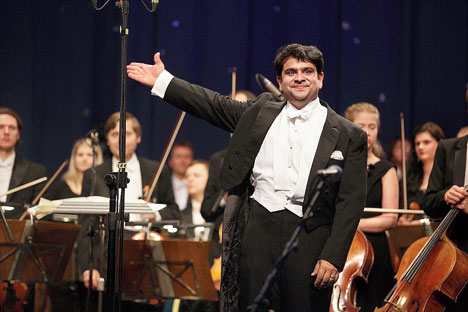
The Czech connections with India, and with Calcutta, specifically, are more than just a cabalette, a short operatic aria. For the coincidences, connections and cultural roots run deep between the Czech Republic and the city of Calcutta. When the 60-member Martinu Czech Philharmonic under the baton of Maestro Debashish Chaudhuri gave a magnificent concert this January, under the auspices of the Calcutta School of Music (CSM), not many in the audience would have known about another dramatic musical rendering 75 years ago.
It was the Batanagar Czechoslovaks, 60 of them in traditional costumes, who performed a Czech comic opera to a packed house at the New Empire theatre on October 25, 1943. The occasion: to commemorate the 25th anniversary of Czechoslovak Independence Day. Giving the evening its grand start was Dvorak’s New World Symphony conducted by Philippe Sandre, the Frenchman who founded the CSM.
It was, again, Antonin Dvorak, renowned Czech composer, whose Symphony No. 8 in G Major got Calcuttans on their feet to ask for encores at the recent Calcutta concert. And what encores! One was a Leroy Anderson pizzicato where the audience clapped in unison, while the second encore piece got everyone singing full-throated to D.L. Roy’s Dhanadhanye pushpey bhora, in orchestral sync with the Czech Philharmonic.
Where do they all come from —these musicians? A small charming township called Zlin, where Czech philanthropic industrialist Tomas Bata helmed his Bata brand way back in 1894. India got a huge footprint not long after, when, in 1934 Batanagar became a manufacturing hub and then a thriving township.

The serendipitous manner in which we found the musical proclivities of the Czechs who made their home for decades in Batanagar is through a stash of memorabilia by one Oleg Plesek. During my research for The Calcutta School of Music : A Symphony Centenary, a tome to commemorate its hundred years, Plesek appeared through the email with reams of reminiscences from Down Under. He had come with his parents as part of the Czech family of early Bata pioneers in the 1950s and ’60s.
And so, young Oleg, a Czech born in India, finds himself learning first the violin and then the piano accordion, playing tennis at the Calcutta South Club while watching Naresh Kumar and Ramanathan Krishnan, studying in boarding school at North Point, Darjeeling, and on occasion taking a rickshaw from their flat on Park Street to Wellesley Street with his violin case on board. He leaves like many others for the greener Australian pastures.
The story comes full circle when a 70-something Plesek makes a sentimental journey to Calcutta and brings with him an Aussie aboriginal wind instrument called a didgeridoo, which he presents to his alma mater in 2015. No didgeridoos, for sure, in the huge repertoire of instruments which the Martinu Czech Philharmonic came armed with for their four-city India tour, complete with a key Bong connection — their conductor Debashish Chaudhuri. Born and musically honed in Calcutta. The first Indian to study at the Prague Conservatory and now a sought-after conductor in the European arena, and of course in the Czech Republic itself, which he has made his home for close to two decades now, with wife Jana, one of the most outstanding Czech pianists today.
We want to know first-hand from him how India is promoted or perceived in the Czech Republic. The Bengali language, in fact, is a matter of deep study for them, says Chaudhuri, as this and other Indian languages are taught at the university level in Prague. A special example is Martin Hribek, a professor of Bengali and Indian Studies at Charles University in Prague, who has spent considerable time in Calcutta. At the Victoria Memorial just last year, he gave an illustrated lecture, in Bengali, titled Bideshir Chokhe Durgapujo.

He says the Czechs love India and celebrate Holi and Diwali. Why, there’s even a Calcutta girl, Papia Ghoshal, who lives in Prague, an artist and a baul singer, who “performs” Durga puja herself.
Tagore, of course is known, revered, read and translated extensively in the Czech Republic. And there’s Thakurova Street in Prague, named after Tagore, where a beautiful bust stands.
So, Indophilia continues apace, this time, gastronomically, in Prague, where Chaudhuri recounts 40 Indian restaurants that have sprung up. There is talk of a link between an Indian city and a Czech city. As also an upsurge in the interest in European music, and getting more students across to Europe to study music.
Another melodic connect — the AIR signature tune. An evocative hummable if there ever was! It is said to be based on raga Shivaranjini, and composed by a Czech — Walter Kaufmann, who was director of European music at All India Radio and one of the many Jewish refugees who found a haven in India, in the 1930s.
The signature tune continues undiminished, as do the growing Indo-Czech ties.
(Rita Bhimani is a public relations veteran)










